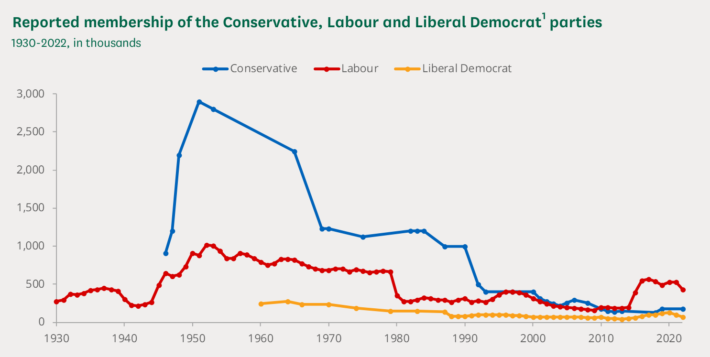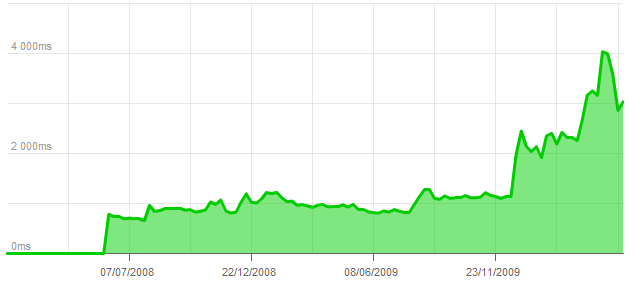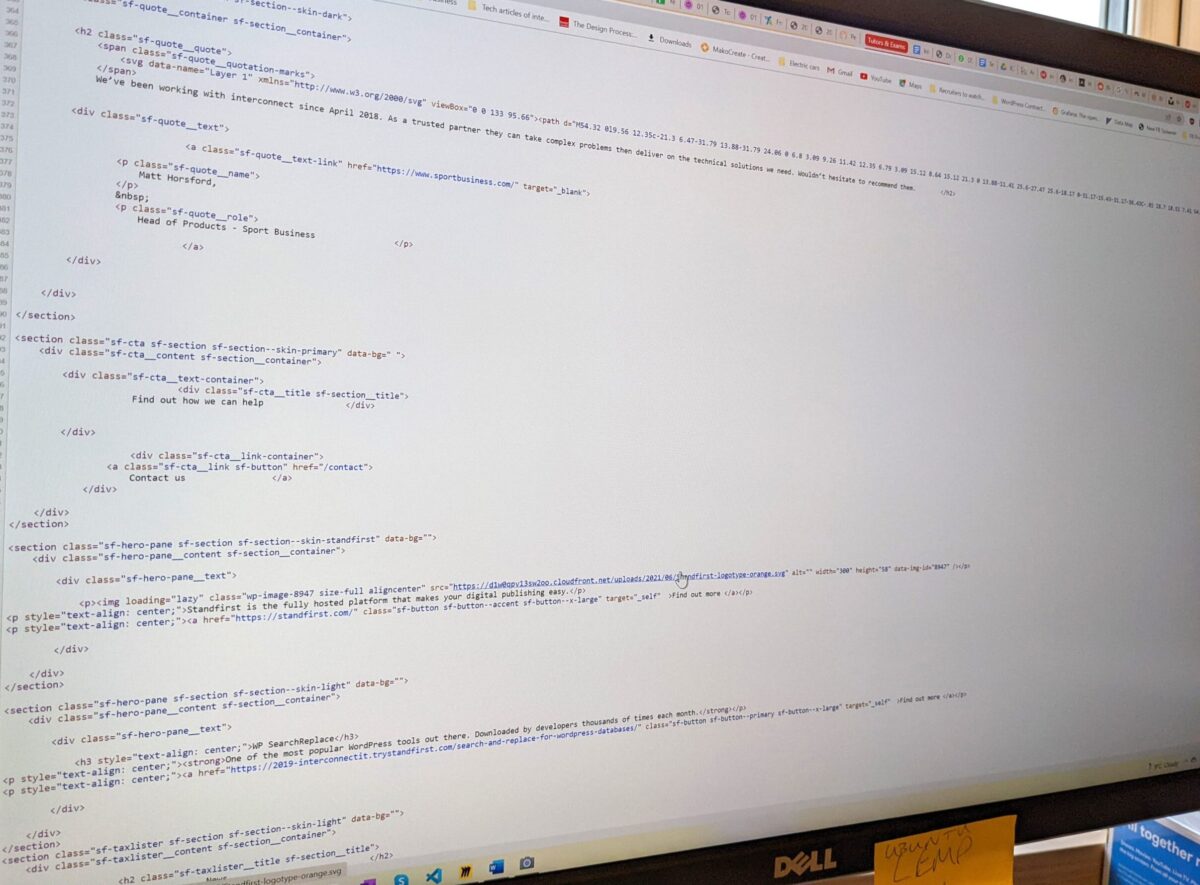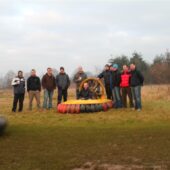In the past, this website was sort of my place to keep family and friends in touch. I first set it up in 2005, just before going away to Peru on travels. It was a great. Facebook had been invented but wasn’t generally available or popular yet, other platforms weren’t well thought through or scattered, Twitter didn’t exist. But installing WordPress on my cheap Yahoo web hosting turned out to be one of the easiest ways to publish content and share it with the world.
Tag: Stag
Steps and missteps on my path out of poverty
At 18 I was skint and got made homeless. It took a lot of graft, patience and mistakes to get out of that and into a moderate middle class lifestyle. Here’s how.
When I was 18 I found myself in a weird situation. October 1987. I’d just started my first job, straight from 6th form, and was happy with that. My favourite song the year before had been The Future’s So Bright, I Gotta Wear Shades. I was optimistic and hopefull. I’d done my A levels finally surrounded by people who actually cared about education. I was no star pupil at 6th form, except at computers, but computers were the big thing so I had confidence.
All good then. I mean it wasn’t perfect, but I just had a fresh optimism. I’d lived with my grandmother since I was about 12 (my childhood memories are imperfect and I have few witnesses to refer to. I’d been casually fostered for a number of years prior, was fed up, and had been dumped with her. She was one of the few consistent things in my life and could see I was breaking in front of her. So I in effect ‘divorced’ my father and she took custody of me. She lived in a mobile home type caravan at the time. She was poor, but stability mattered more to me. I got my education. The future felt very bright.
I got through the various stages of ICI (then one of the largest chemical firms around) to get a job in their computer centre as a trainee printer operator, with the idea being to climb into a programming job. Unfortunately, a few weeks later, my grandmother had been in a lot of pain and, within a day of being admitted to hospital (this is another story to tell) where we discovered she had terminal cancer. Very terminal. She had less than a week left.
I was so very alone. My father turned up, signed over to me to handle everything, then disappeared to South America, never to be seen again. In 1986, my mother who I had some mild relationship with, had taken her family to Spain and, for some reason, me being told and having a goodbye seemed to be forgotten… so I’d accepted they weren’t a factor in my life. That was it. Me, alone, in the world.
Things got quite bad, quite quickly. Here’s what I learned, what I did wrong, and what I think I did right.
The world is not your friend
When you grow up, generally there are adults who look after your interests and needs, until you’re old enough to do it for yourself. But often you feel this interconnectedness with everything being generally good. Often in adulthood we discover things can be quite different – especially if we have some failures. I think learning that the world isn’t your friend is important. I discovered, for example, that if you have no cash, you can’t just take over a substantial asset (a house, in this case) and expect to not pay off debts that your grandmother had. The answer should be simple – I could have borrowed from another bank or building society to buy the house off my grandmother’s estate. Except her bank refused unless my grandmother’s estate was up to date on the mortgage payments. And because my grandmother’s estate had debts and no income, it couldn’t make the mortgage payments, and I was advised that if I paid the mortgage it would potentially make me liable for everything. When you’re an eighteen year old that leaves you in a bind.
The bank took the house, and I was made homeless, briefly (I kept a spare key and let myself in at night to sleep on the floor!), and I quickly organised myself and bought a tiny flat. Good job, because the council wouldn’t help me, the bank wouldn’t help, renting privately was almost impossible for me. Thank heavens I was organised and found the right combination of people.
Finance is risky and can be expensive
Because I was young with little credit history, all finance was risky. I figured that with my job and my flat I could now live a little and went stupid, bought myself a small engined sports car – a Scimitar SS1 1300 if you’re a car geek – a tumble dryer and washing machine all on credit, and thought everything was great. But I had nobody around to advise me I was being dumb, remember? No parents, and even most of my friends had gone off to university.
What happened was that when something went wrong with the car, it really stretched my finances to fix it. Then it got stolen and damaged, and I either repaired it myself or my insurance would get really expensive. Every little bad thing that came up, made life harder. But I discovered that I couldn’t just sell the car and forget about the finance – the interest and the way they did it meant that I’d need the value of the car plus another £1k to pay it off. I was trapped.
Toxic parents usually remain toxic parents
My father was still in touch with me, but for some reason thought I had plenty of money. So when he got into financial trouble in South America, he started giving me hard luck stories about how dangerous things were, that he was going blind (or a bit long sighted as we call it now), and he needed £1.5k. Or £3.5k in today’s money. I was 19, skint, and instead he banged on about how I must have had money from my grandmother’s death and my good job. “Yeah, Dad, but you’re not here and you have no idea.”
However, guilt led me to do my best. I sent him all my spare cash for a couple of months, before finally arranging a loan. I used some of it to consolidate my credit card debts, and two thirds went to him. I sent him, if I remember correctly, about £800 in total. He wrote to say he was struggling and needed more and he was in a dangerous situation I didn’t understand.
So I did what I felt was the right thing – I spoke to the Foreign Office, and eventually secured a facility for him to be able to catch a flight home, where he’d at least get benefits.
I called him, told him the good news, he was furious. And that was the last time I spoke to him. Ultimately, narcissistic, self-centred and selfish people rarely understand that other people have struggles. They just don’t get it. And they stay that way.
Stability matters
One thing I did right was to stay at ICI for many years. I kept that job. My head wasn’t in the best place, so I wasn’t the best employee, but I was useful and smart enough to keep it as well, and had some reasonable progression. For a while I’d been renting rooms after financially over-extending when I lived in my flat, and that job gave me the much needed anchor to my life. Eventually I bought a house with my then girlfriend. That stability then allowed me to think about taking a risk again… But it also established a nice final salary pension plan that will still be useful even 40 years after leaving!
I went contracting
Sometimes, income really matters. I don’t think contracting is for everyone. I hated some aspects of it, and it ruined my relationship at the time because I was away from home so much. But it really helped bring in money, which then really helps you to just establish a buffer of more than a month or two of money. Suddenly I felt like I had an actual surplus and proper savings. I got rid of the rust wreck of a Peugeot and bought a three year old Rover. I started to dress more smartly. I had nearly ten years of this solid and high income and it probably made the biggest difference of all to me.
At the end of my ten years, inflation and low interest rates made my mortgage look tiny, I had asset wealth in the house, shares, and low outgoings. When you’re in that situation, as many middle classes get born into, you can start to take risks. I decided to set up a proper web development business, now called Interconnect.
I could have lost a lot with Interconnect, and we came close to giving up. It didn’t ever give me more income than contracting – not even close. But it does give me another source of stability. And that, dear readers, is worth more than you might think.
I learned about how money and how the stock market works
There’s one book I read early one which just opened my eyes to the world of money. I’ve bought it several times, lent it to people, forgot who I leant it to and lost it! Doesn’t matter, it’s worth it. Its called How The Stock Market Really Works and it goes way beyond stocks, shares, and bonds, but into planning, risks, retirement and so on. In reading it, several times, I established a baseline of understanding that stopped me falling for scams, stopped me making bad investments, and generally helped me ensure I could make best use of the spare money I had.
I no longer pushed my finances hard
Now I understood money better, I knew that, for example, if you have assets of £100k and a debt you can’t pay of £50k, you’re in a really really bad situation. If you have assets of £10k, a debt of £100k and some short term cash flow issues, then you’re in a strong position to start negotiating. Why? Because if you have no assets and a big debt, the bank can’t recoup anything much if they send in the bailiffs. Once their costs are accounted for, they lose everything. So they’re more willing to negotiate. If you have loads of assets, you’re stuffed. That was, in effect, what the bank did to take my grandmother’s home from me when I was younger. They had no motivation to negotiate with me.
So you either max out your finances, Donald Trump style, or you very carefully segregate them. Because I value stability and security above all else, I segregate them.
I learned to think like an accountant
After ICI, I spent a lot of time working in corporate finance departments on their software.
Here’s a thought experiment. You have £10,000. You go out and buy a car for £9,000. How much are you worth? The naïve answer is £1,000. You see yourself as £9,000 worse off. But if your car helps you earn more money by opening up a job you otherwise couldn’t reach where you’ll earn £5,000 a year more, then you have two things happening:
First, your balance remains at £10k, because you have a £9k car and £1k of cash.
Secondly, you have a future benefit over, say, the five years you expect to have the car, of £25k. So over the five year period, assuming the car becomes worthless, you’ll end with £26k on the balance sheet. Or you use that £26k to put into a mortgage which, again, is generally a good move because it’s a limit liability loan secured on property which, in most economies, is a pretty safe bet.
But all accountants will say that cashflow is of utmost importance. You may have a pile of assets, but if you can’t service your responsibilities then you become insolvent – you can’t always easily sell assets without a big loss. So always think about cashflow – it’s best to be gently increasing your cash position as your wealth grows.
I learned to let go of status plays
When I was young I caused myself trouble by buying that sports car. It wasn’t, in itself, a bad buy on the surface – sports cars depreciate more slowly, the insurance on this one was the same as a similar powered Ford Escort, and it didn’t use any more fuel. And it’s not like a 19 year old needs to carry a family. Two seats was fine. Reliability wasn’t great either. But where it went wrong is that my boss therefore believed he paid me too much! My older superiors didn’t like that I had, on the surface of it, a fancier car than they did.
Of course, I was financed to the hilt, and they weren’t. They didn’t know that. They just assumed I had more money than I let on to.
Had I been in a humbler car, they’d have had no idea of my financial status.
It’s better to let people assume you’re a bit skint, and focus on reliability plays in order to establish your career. Took me into my thirties to work that one out.
Same with clothes. Stick to cheap clothes until buying them is easy. If you do what young me did and buy everything on credit at Top Man and Burton’s (yeah I know) then you’re setting yourself up for bad decisions and bad outcomes.
Adaptable accent and open attitudes
I’m actually quite Scouse yet a lot of people I meet and work with down South just think generic, educated Northerner with a light accent. The reality is I just adapt my accent to suit the situation. This means I don’t terrify upper middle class people, whilst I can still sit and have a chippy lunch with garage mechanics. Non-threatening to everyone, basically. I accept that most people know stuff I don’t, that they believe they’re trying their hardest (they may not be trying optimally, or coping badly, but I accept their belief), and generally try to learn from the people I meet.
Meet lots of people from different backgrounds
The more people you meet, the more lives you get to understand, the more mistakes you can avoid and the more opportunities can come up. Local politics can teach you how councils and Westminster works. Bankers can tell you how finance works. Medics can give you really good reasons why you shouldn’t smoke, drink, or eat too much sugar! Bin men can teach you that you can make a good living even if you’re not well educated (or are – there are some very well educated bin men and women out there). Truckers can tell you how their industry works.
Just avoid the cynical and the put upon – there’s little useful information there.
One good thing with the internet today is that there’s so much sharing online that you can virtually meet almost anybody, from African villagers to corporate board members. Just be kind and open and remember that they’re all humans, every one of them.
What about you?
None of the above is unique to me, or in any way makes me special. I just think they’re what helped me. Feel free to comment on what you’ve experienced. Everyone lives different lives and found different ways out of poverty traps. And of course, some people find themselves ground down by a system that can be unfriendly and downright hostile at times which means they can never escape, no matter how hard they work.
Images by Dall-e 2
Interesting times in the world of software
About a decade ago, I was at a conference and talking to a fellow developer (I still call myself one, even though I don’t code so much these days) when he giddily told me about the funding he’d got for building a new piece of software he was hoping would make it big. It was a two year project and he’d got £100k funding. I asked if it was just him… and no, he had a colleague. So £100k, for two people, for two years? £100k didn’t sound a lot… £25k/yr each, basically. Or what you can earn in a much simpler tech support role. I decided not to say anything and leave the poor guy in peace, although this sort of work seemed a lot like gambling to me.
Today, things are different although there’s still a sniff of gamble about it overall. If you’re a developer it’s relatively easy to find a highly capitalised employer that’s positively dripping with money who will pay you £60k-£90k a year. Potentially quite a bit more. This reminds me of the late nineties dotcom boom. In 1997 I myself quit my safe but somewhat dull job at a multinational to become a freelancer, doubling my income almost immediately, and quadrupling it another year later. The new work was, in some ways, more interesting. It was also a lot more stressful, bad for my health, and definitely wasn’t the most exciting coding work. But it paid. I honestly don’t blame developers who decide to do what I did 25 years ago. It set me up. I think it was also a large part of why I had a heart attack in 2019… living out of hotels for a decade wasn’t healthy, and cheese became far too much a food staple for me as a vegetarian. However, the money was very good and it helped set me up. When you’re poor, it’s very hard to catch up and a good income was necessary for a while.
I bring this up because today I’m not ‘just a developer’ but actually run a web development company that specialises in websites and custom software for clients. And things are happening today that are reminiscent of the dotcom boom on the late nineties. 25 years have passed, but people don’t really change nearly as much as you may think.
The dotcom & Millennium Bug era
The late nineties were a period of post-recession growth and capital release. Banks had been deregulated, money was being created in the way it can be, and we were riding high on increasing productivity. Life felt good. And when money is created it can be invested.
There’s only one little problem in that. Sometimes, people get giddy and start splashing the money out too readily. The boom of the late nineties and early noughties, and the deregulation that encouraged it around the world, eventually led to the financial crisis of 2008. I’m a bit of a cautious soul, so even though I had plenty of income, I resisted borrowing too much to get a bigger house. In some ways I was foolish, because I could now be living mortgage free in the house I have now. But I figured that not having a big mortgage would afford me some other freedoms and I could use my money elsewhere. Mostly I just invested my money in solid companies. Friends, however, were telling me to invest in dotcoms. But I looked at the fundamentals. One example was a firm called Vocalis. They did, basically, telephone voice services software. Small team, and had some crazy valuation that was effectively equivalent of £20m per member of the staff. I rightly reckoned that was mad. My friend went ahead and pumped money in, and I mocked him. For a while I looked a fool. The value of the shares rose and rose.
Right now, there are loads of speculation bubbles. At the café at work I was trying to explain Bitcoin’s fundamental problems to our barista, when our receptionist came over excitedly wanting to know more. Both seemed interested in getting involved. That means the crash is likely imminent. They’re both lovely people, but in the economic chain, they’re nowhere near the top, which means that the speculation bubble is reaching it’s limits.
“If shoe shine boys are giving stock tips, then it’s time to get out of the market.” – Joe Kennedy, 1929 as the stock market was about to crash and lead to the Great Depression
So the dotcom boom and Millennium Bug led to a boom in demand for developers. New software was being created to replace supposedly outdated software that couldn’t be fixed (narrator: “It could”) and salaries were rocketing. I took advantage of that boom. I also knew it wouldn’t last. And it didn’t. My day rate as a PeopleSoft developer went from £200 a day in 1997 to £600 in 2002. It could have been higher. Cisco did an amazing job of raising funds in that era and I remember they kept offering me more and more to go to work for them in the Netherlands. But I didn’t really want to go to work there. I never really chased the money, so that’s about where I peaked. But I remember people with the right skills, experience and self confidence were on as much as £1k a day. That’s getting towards £2k a day at today’s prices. Some skills seen as super hard and rare could command double that. Most people didn’t, of course, make nearly that much, and some people preferred a job with reasonable hours and close to their families – a very valid and decent decision. But I was single with no ties.
There are a lot more developers around today – good incomes have brought many people into the trade. I meet people who called me a nerd in the eighties and now they’re working in IT. It’s a bit weird.
Today’s situation
Now it’s a bit weird. Rates still aren’t at the dotcom level, once adjusted for inflation, but they’re close. You can do very well in tech. But in my little firm we pay typically around £40k for a developer, plus various benefits, kit, resources etc, meaning you’d need to make around £70k as a freelancer to equal it. At least the way I calculate things and always did. I nearly swapped my £600 a day for £60k a year and kind of regret not doing that.
But why have the rates risen? Well, there are a few hot areas, and they can be summarised as AI, analytics, mass market apps, and blockchain. I’ll discuss each briefly:
AI
This is a hot one – the idea we can replace rooms full of people doing dull and not very high value work (from the perspective of the company) such as service desks with AI bots is very attractive. It won’t work though. Most “supposedly AI” bots are just following decision trees and the only bit of AI is in parsing the meaning out of a sentence in a very tightly defined context. AI is useful today for categorisation problems – e.g. looking at a picture and deciding “this is a cat” or “this is a threatening comment”. It’s not brilliant at the job, but I like that an AI can work out which pictures are of my Mum, for example, even if it misses about a third of them… it still makes my life easier. A bit. But what an AI can’t do is right a decent blog post. Sorry, it can’t. They’re awful at it. There’s loads of AI generated content out there and it feels obviously fake. The main job of these AI generated blog posts is to trick other AIs (Google, Bing etc) into categorising a website as useful. And because AI’s make toddlers look worldly wise, they can be easily fooled… and that means you can’t trust them with anything of real importance. Like your business decisions.
But, it’s a hot keyword, and naive venture capitalists like the idea. So in comes the money.
Analytics
Tracking and stalking customers across the internet is very attractive for advertisers believing that doing so makes them seem more interesting to consumers. I’m not convinced. People often find it creepy. They feel like they’re constantly stalked. They visit the website of, say, a printer supplier and they receive ads for a month for printers… but not only for that supplier, but for other printers because the tracking provider is cheerfully using your data as a supplier against you and selling that information to your rivals! I think advertisers are starting to cotton on, but are unsure of what to do… but I know there’s a lot more direct selling of adverts between publishers and advertisers than there used to be.
But, the siren call of analytics is strong, and people love a nice chart on which to justify a decision, so the more nice charts your system can create, the more people will pay to use it and try to gain an advantage over competitors. And advertising is huge, so in pumps the money. For now.
Mass market apps
Can you build the next Facebook, Instagram, or Slack? What’s the potential for an app that lets people read books from any publisher for a fixed monthly fee? How about an app that revolutionises food delivery? Interestingly, some apps are about replacing old and inefficient intermediaries and putting new ones in place. Uber is a nice way of hiring a minicab with flexible pricing that rewards drivers for being available at the right time. They don’t disintermediate, however. The customer is both the driver and the passenger. The new intermediary takes their share.
If you can replace old intermediaries you can make a lot of money. Imagine taking 0.5% of every single financial transaction, like Visa do? That’s a lot of money. Then you have intermediaries between the card firms, providers, and networks, such as Stripe… and then there are those replacing old ones, like Wise, for money transfers across borders.
What other things can be improved? Well, literally anything.
But most attempts to build these apps and the supporting infrastructure are doomed to never turn a profit.
Blockchain
Blockchain is a really interesting concept for a public ledger, using an interesting concept called proof of work to make it hard for any one person to try to dominate the network and win the consensus mechanism on new transactions. There are theoretical ideas out there to improve on this, but at the moment they remain just that and haven’t been proven.
And it’s a scam. Pure and simple. But it’s a hot topic. Bitcoin, Ethereum, Dogecoin and many others are actively speculated upon, as well as being used for the exchange of value – often in a hope to evade regulators. It appeals to the natural rebels amongst us because it’s outside of government control… and given that governments aren’t always a force for good, I get that.
Problem is, Blockchain breaks the rules of good software development… if you look at the big O notation for software, it has to follow certain rules or it will fail at some point and need to be re-engineered. Big O matters. I don’t have academic access to papers, and the internet is full of vested interests pretending that Blockchain scales just fine. I used to see the same in WordPress land, where people said the software scaled fine… but it doesn’t. In WordPress we get scale by putting a layer between WordPress and the internet to balance things out – the work the software itself does goes up in line with the number of people talking to WordPress. We can define that as O(n) so long as you know what you’re doing – that’s OK. We can live with that. But the consensus mechanism required for multi node agreement of transactions as required to track transactions will, by its nature, follow a curve that is likely to be somewhat greater than O(n^2) (each node does O(n) work in a linear fashion but the total work done on the network as each node is added therefore grows as O(n^2) plus a bit for network latency and overheads. Yet bitcoin transaction cost isn’t following that curve in spite of huge interest because, I reckon, most Bitcoin trades aren’t real.
Yes, that’s right. And what does that mean? It’s because wideboys, crooks and the overly-optimistic are involved. Given it is, by design, a pyramid scheme, it will have to fail at some point. But people are motivated to hide that, so there are Bitcoin tracker schemes, rather like gold purchase schemes, that never hold the asset in question. They will pump and pump values as hard as you like. And as long as there are new people coming in, like our receptionists wishes to, all is good.
And there are enormous amounts of money to be made. As in a goldrush, the people making real money are the shovel makers and traders. And they need developers. So for as long as there’s money to be made, coked up wide boys will be gurning their way through stressful meetings, fidgeting and anxious to cash in before it crashes out. You can earn a lot there. For a while.
OK, so thanks for the very long essay. What does it mean then?
Well, it means developers are really expensive right now. Small firms that do actual useful work and aren’t highly capitalised (like mine) can’t grow because we can’t suddenly charge our customers double for the work so that we can compete against these booms. It’s as if a very rich person has moved into your town and hired all the builders possible to create a huge mansion. They even approached builders working for firms and offered them double to come build that mansion. Soon builders are all swanning around town in Teslas and feeling pleased with themselves for being so cunning as to be in the building industry.
Same in software. Locally there’s a Tesla with a crypto referencing private number plate and a young, bearded and muscular techbro driving it. Fine, I’m not going to judge. He’s happy and making good money.
But if builders are all hired by the rich, the rest of us get priced out. Same in software. Small firms are going to find they can’t afford websites unless they just use some cheap web builder platform – it’ll give a less good solution, but it’ll do the job. Ish. And the firms that can afford will do that bit better. And better. And the gap will grow.
At my firm I’ve had to raise salaries, but we still struggle to clear a profit with the raised salaries. I’m fiscally conservative, so we’ve always had decent cash reserves. This lets us ride out the storm. From 1997 to 2002 dev rates went crazy. By 2005 they were back to normal again. We as a firm can’t handle eight years of this. But it’s not quite the same as back then – you can now hire developers globally and have them work remotely, if you really wish to, which can save some money and also help those countries out with extra foreign revenue. I, however, really like quality and good communications and I find that a geographically tight team works the best. It also makes it easier to hire new people into the trade. So, for now, I’m sitting tight. I won’t seek venture capital, or borrow. And if the worst comes to the worst, we’ll add AI to something that does basic statistical analysis, and blockchain to something with two computers in the network and hope someone out there fancies throwing us some money so we join the party. In the meantime, however, there’s still a healthy living to be made as a business doing useful things and avoiding the hot trends. I never set out to be rich, merely secure – I’ll ignore the rich mansions and do my own thing, creating good code for good people.
n.b. about the above – the above isn’t a paper. It’s a set of opinions designed to inform and illuminate about what’s happened. It relies on anecdotes. Don’t take it too seriously and don’t use it as the basis for what you want to do with software and investing in software. Or crypto. Do your own thing with the information you gather from multiple sources. Also remember that a lot of people say misleading things because it’s in their interests to do so, and that you shouldn’t trust a random blog or news source on the internet. Mine included.
Why political parties lose support by winning.
People do like to look back angrily, don’t they?
Yet many a time, their anger today doesn’t reflect how they really felt back then. If you look at the Iraq War, and the UK’s involvement in it, most people supported the action. For sure, an awful lot of people today don’t think it was right to be involved in Iraq. And if you suggest they did, they react angrily and deny it vehemently.
A Yougov poll and survey suggests that what’s happened isn’t the same as what people say happened.
Are people lying?
Not really. It’s more that most people’s memories are far more plastic than people realise. Hindsight bias is one type of problem with perception.
So if you support Labour right now, it’s very easy to throw everything that happened in the Blair years under the bus. To disassociate yourself from the man who was involved in starting an illegal war in Iraq. It was obviously illegal at the time. That’s why you cut up your Labour membership card and joined the Liberal Democrats. Right?
Labour membership did plummet just afterwards.

Oh.
It was already pretty much half what it was. In other words. The plummet started… when Blair got into power.
Membership up in opposition when an attractive leader turns up. Down when he or she deals with the tricky nitty gritty of life in power.
Never mind.
At least councillors, being local and well known figures in their communities, won’t be punished by the parliamentary party shenanigans, right?

Dammit. No. Whilst Labour were in power, their councillors dropped off. Whilst Lib Dems were in power… their councillors dropped off. Whilst Labour were in opposition, councillors went up.
So in the Lib Dems, a traditionally localist party, we can look back and see that being in government was terrible for the party. But it turns out, that being in government is terrible for all parties.
Why?
Because, it’s hard. Being in government is tough on a party. It means making difficult decisions and trade offs that can’t possibly satisfy everyone. And they can express that dissatisfaction and will hold onto it for a cyclical period.
Which leads to a question. What’s missing in politics? Why does the party in power always suffer loss of members (although Conservatives have been failing to gain members whilst out of power, which is a problem for them) and councillors and never please the majority of their actual supporters?
Is it a case of becoming complacent? Like a decent but lazy football team that gets 2-0 up and then coasts to a 2-3 defeat?
I’ll posit another reason.
No party politicians ever manage to engage with a majority, because they never address all the issues
So here we go… turnouts for the last twenty years have always been below 70%. And not above 80% for over fifty years. That’s in spite of it being ever easier to use postal votes.

And the number of votes for the winning party has hardly ever been over 50%.

Look at that. Since 1930, no single party has offered a view to satisfy the majority of voters, let alone the majority of the population. So when a party gets into power, it’s in an unenviable position – most people don’t want them there.
Only twice have there been governments that are technically approved by a majority – the WW II coalition, and the 2010 Conservative/Liberal Democrat coalition.
Both weren’t rewarded by their voters.
If we keep repeating the same mistakes, all parties keep losing by winning
One of the best ways to avoid losing your hard fought members is to not win. UKIP have almost entirely fallen apart recently… because they ‘won’ at Brexit. Boom! Job done! Party wiped out. Their purpose over, and the public scrutiny of the Brexit process rapidly revealing them as little more than political arsonists of little substance. Everything they said turned out to be bluster. It’s not the fault of the immigrants, and it’s not the fault of the EU that people’s salaries have been stagnant. It’s more to do with a greedy class of company boards and underperforming pension funds coupled with a financial crisis. The reasons for all that I’ll go into another day.
Now, given that avoiding losing members and popularity by avoiding winning in parliament sounds like a silly idea for a political party, we have to think a little more deeply about what anyone, in any political party, can do to actually get some stability back into the country.
I have a few ideas, and I’m using my marketing and business experience here…
1. Work for everyone, but especially the people who have been left stagnant
The economy has been stagnant for a lot of people, for a long time. Not the very poorest, who are generally in a better situation than ever before.
Not the very richest, because they’re actually quite well off and much more so than for a long time.
Labour has systematically failed people who are not unionised and who work. Try being a cleaner on £8 an hour, looking after two kids, and dealing with school holidays and child care in a constructive and nurturing way. Go on. It’s almost impossible.
And the Conservatives have been cutting finite resources, such as social housing (and Labour, when in power, didn’t grow social housing either, so they can’t get too smug here) and then both have become surprised when populist anger has risen, blaming immigrants, globalisation and bankers. Yet without more immigrants we are not going to be able to care for our elderly, or deal with our NHS… we will go bankrupt. If we allow the populists to leverage the anger of the people who have lost out from economic growth, then we will have huge problems in the future.
This graph charts the distribution of income across earners, with 50% of people getting only 20% of the income and the top 10% most recently getting 35.7% of the income – so 3.5x as much as the rest.
On the upside, it’s way better than it was at the turn of the 20th century. But the lowest half haven’t increased income that much, and the top have reduced income, so it suggests that people the top 50% to 90% range, the middle classes, have done best of all and must have seen their incomes do quite well in that period – probably largely due to the emergence of a new technical class.

2. Stop looking at averages
Don’t look at averages, but look at curves like the above. Those poor performing people, those losers, are the working class and lower middle classes of Western economies.
We need to look and listen to the stories of people and stop looking at averages. Average income going up is no use if you’re in the group of people where average income is not going up. But we need to find convincing stories to bring back to them. We can’t say “Hey, we’re cutting back all the welfare for you and spending on your schools, but we can spend it on bringing in a load of immigrants!” Now, we are 100% correct that we need lots of immigrants here, but we have to explain why – if our economy is based on the amount of workers and the amount of capital in the system and we’re not replacing our population then populists will do the stupid thing. They will say “No to immigrants! More welfare and money!” But that can’t work. It’s pathetic.
But it’s imaginary and easy and short term. So when Farage says this they’re just trying to take advantage of a situation that the rest of us leave lying around.
3. Politics has to stop ignoring the voters
All parties are doing this. They pretend people are better off because they can afford smartphones and big TVs, but if going to university leaves you with a massive debt (rather than leaving it on the shared government balance sheet) and you feel you can’t afford a house like your parents had, then you don’t feel better off than your parents did… you feel annoyed and angry.
But listening to the voters doesn’t mean doing what the voters tell you to do. It means showing thought leadership. Explaining, patiently, why you can offer more than the previous status quo. The constituency I live in has voted Labour since its creation. But it hasn’t become better off even when Labour were in power. Why not? Why did house prices still rocket up?
4. Create these policies
Because I’m intolerably lazy, I’ve broadly nicked these 5 changes from an expert on all this. A chap called Mark Blyth. He’s an expert. I know we’ve had enough of them, and I know why we’ve had enough of them. But Mark Blyth is genuinely sharp on this. Look him up. He’s not right on everything, nobody is. But that doesn’t mean these points aren’t valid:
- Make university tuition free again. Because it takes a stress away. Yes, the system in the UK is very well structured and very fair, but it doesn’t feel it. And that matters.
- Provide much more subsidised childcare over a broader. Including during school holidays. Because it discourages women from fully contributing when the cost of childcare for two children is more than a salary. And because it helps single parents to function properly and give the nurturing care their children need.
- Resist and prevent the NHS being dismantled or turned into a multi-payer US style system. Simple, that one. The NHS is hyper-critical.
- Corporate reform of how shareholder value is distributed. I know this will scare the capitalists, but it shouldn’t. Because trust me, an angry and inward looking economy looks like North Korea or Venezuela. And that’s even worse for you. You’ll still be rich if you can keep our economies open. Trust me.
- Break up or open up digital monopolies. They have too much power and too many rewards for too few people, with returns of over 60%. That’s just not sustainable. So you have Google blocking YouTube from certain platforms and Facebook downgrading your pages’ natural viewings if you don’t have a healthy advertising budget.
If you notice, none of this says “Punish the rich.” Don’t do that. They feel unfairness as much as anybody, and there’s no point making them angry as well. Just fix the structural issues and things should balance out fine. You don’t need to simply turn up and take their money off them with a massive tax application. Just make sure their money has to be invested, rather than spent on impressive schemes like rocket ships that don’t address the problems that many people actually face.
Enough already
That’s my thoughts for now. About 1800 words of them, which is enough. These are the under-considered problems of the past generation, that are structural and required for a political party to prosper. And, if they get it right, perhaps they can even get a majority of people on-side.
Who knows eh? Maybe somebody can do it, and can convince enough people to do so. I don’t really care whether it’s Labour, the Conservatives, or my own favoured party, the Liberal Democrats. But somebody has to do it before the populists get another chance at polling booth. We don’t want them. At all.
Photo by H E N G S T R E A M on Unsplash
This article was updated with new charts and some copy changes on the 28th of May 2024.
Doug’s Stag Weekend
The Mission: Have fun, and find subtle and not so subtle embarrassments for Doug Watts, the stag for the weekend.
Equipment: A lesbian DJ, two hovercraft, alcohol, four cars, Oswestry, and Manchester.
The Evidence:
Pictures after the two group shots are by Andrew Lewin – they’ve got Doug in!
The Story of Juanito
Here’s something… a smiling, happy and charming man who knew my father in Arica, lives just around the corner from the hotel I’m staying at.
He actually lives in the cabin that guards a car park. Just him. He’s been married twice, I believe, but that’s all I know.
So how can I tell his story?
I can’t, not really.
But it made me realise – he had many things in common with my father. Two marriages, keeps quiet about his personal life, and a very modest lifestyle. And truth is, I see people like this all the time. And they all have a story. It’s just that it is, largely, untold.
Even when it is told, you only have their take on it. Given how fragile memories and emotions can be it’s almost impossible to extricate what’s really happened.
Pushing Away
I think it’s entirely possible that anybody can end up alone and relatively marginal. Worse, some can even end up utterly destitute and on the streets. Something makes this happen to people. They destroy their personal relationships. Before too long, they are relatively alone. They have friends, for sure, but not close ones. And drinking friends, as we all know, are the ones who aren’t there when you need them.
If we look at my father, he ended up being rejected by me. If you look at the picture of me with my father, you’ll see something that I’d never noticed until a psychologist here noticed it and mentioned it to Joaquin… my father is touching me, but I’m distant. I could be just another surly teenager, but here’s the thing… I wasn’t a surly teenager. I just hand’t formed many attachments.

There were two points when I pushed away from my father. When I was around 11 years old he’d split up with his second wife and I was living with my grandmother. I’d struggled to settle into the new school – a rather rough school that was failing its pupils, and the bullying and harrassment had become quite extreme. Yet some level of that had happened at every new school. So I stood firm and when my father suggested I went with him to Belgium I opted not to. Enough was enough.
Wasn’t easy.
That was the first stage. He was obviously angry with his mother who supported me in the process of requesting her to be my guardian, and consequently their relationship deteriorated even further.
He’d already pushed away from his second wife and daughter, simply by failing to cope with certain aspects of the relationship.
Then, years later, when he was demanding money from me, I couldn’t handle it. He was too hard on me. I had to reject him even more. Not so easy, really.
Suddenly, he’d lost all familial contact. Nobody wanted to deal with him or support him. He was a lost soul.
We Judge on the Negative
One thing I’ve realised is that most people form relationships with other people based on the good character traits. They find the other person attractive, or intelligent, or caring… that kind of thing. But they break relationships based on the bad. That may be stating the obvious, really, but it’s important because the bad things are usually a very small part of that person’s character.
Think about it – your average burglar probably spends no more than a few hours a week breaking into house. A wife beater doesn’t beat his wife every day. It just doesn’t happen that way. It’s why sometimes women find it so hard to break away because “he’s a good father” or “he’s so generous most of the time.”
People aren’t black and white, no matter what films and the media appear to suggest. My father wasn’t generally a bad man. Remove the mood swings and the occassional domestic violence and you had a charming, intelligent and thoughtful man. Everyone I’ve met here considered him a good man. If anything, they found him a little naive – he got ripped off and let down on a number of occassions because he trusted too much.
He wasn’t evil.
He just had flaws that made him impossible to live with.
And Juanito?
I know I made the title of this post misleading, but it’s relevant. I don’t know his story. I can’t even suggest that he was pushed away from his family. All I know is that he’s living alone, in a small hut in a car park, and that he’s a personable and kind man.
All I know for sure is that there is a story in everybody, and no matter what mistakes they or others made they’ll feel the pain of their past.
What Have I Learned?
Value your friendships and relationships. As far as I can see, they’re one of the primary things that keep us from ending up alone and in poverty like my father did. It’s important to accept that although they can be a pain sometimes, and oh so restrictive, we need those boundaries and checks that they bring to us. Being told you’re wrong, or being stupid, or hurtful… that’s something we all need to hear now and again because we can all be wrong, stupid or hurtful.
Without that, we can’t limit ourselves, and we can’t free ourselves from our mental barriers. It’s often said that children need boundaries, or they can become insecure. I believe, very much, that adults need them also.
Now, I must apologies for the random keyboard psychology above, and promise that normal service will be resumed soon!
Arrangements, part dos
Anyone who’s experienced the death of someone close to them will know that there is often a lot to do. No exceptions here, plus the added pressure of limited time. However, I’m not entirely unhappy about the time thing… makes me get things done.
Cementaria Parque de Arica

So, following the funeral I went yesterday to the cemetary to finish off the paper work. The tomb is owned in perpetuity by me, although a typical arrangement, that may seem strange in Europe, is to simply rent a tomb for a number of years. Once that time is up the coffin is disinterred and transferred to a shared grave. I also had to sort out maintenance again, in perpetuity. It’s not a lot each year, but with no easy way of paying fifteen pounds to an account in Chile every now and then I had no option.
I actually saw this happening on my second visit. You could see a clearly subdued couple watching as the coffin was lifted from a tomb, cleaned up, sealed in plastic, then loaded onto a hearse. It was a sad sight.
And it’s all made slightly bizarre by the music that’s piped into the cemetary. If you have a funeral it does seem to be suitably sombre, but at all other times they appear to often play cheerful music for the workers to enjoy.

It’s tricky feeling sombre and respectful when you can hear an Abba song.
Still, at father’s tomb it wasn’t so audible.
I took some photos, walked around, paid my respects, and headed back to town for a meeting with the reverend David Hucker who carried out the bilingual service. He’s clearly a nice man, and initially refused my attempt to pay for the service. It had to be turned into a donation to his church before he’d accept. Given the service included a singer, I was amazed. The kindness of people here doesn’t cease to amaze me. We chatted about why he and his wife came here, my own background and so on. All very pleasant.
Headstones
I felt like I’d taken enough of Joaquin’s time so I decided I’d make the effort to arrange the headstone entirely on my own. With limited Spanish and nothing more than a vague idea of where a stonemason may be, I set off.
Now, this is where you have to admire the Chilean desire for efficiency. The hospital is at one end of a road approximately 1km long. At the other, lies the municipal cemetary (not the one Chris is in). Along this road are numerous funeral directors and various parked hearses, ranging from custom made examples to tired looking old American station wagons. Given this is one of the more important routes to the hospital, I can’t help wonder if it helps reassure incoming patients. Still, it’s efficient.
After some aimless wandering I spotted a suitable stone mason, went inside, and did my best. On Monday morning I’m either getting exactly what I wanted, or a very rough approximation with some crazy typeface. Let’s see. Again, Chilean flexibility and a can-do attitude helped. I explained I wasn’t likely to be around for much longer and that I couldn’t wait the usual week. He made it happen.
The House

The next job of the day was to visit the house where my father lived. He’d rented a room here for over ten years.
I had a real shock when the first item brought in was his suitcase. It’s the only recognisable item I saw in his belongings – the same cream coloured Samsonite suitcase he’d used throughout much of the eighties. It was a touch battered, but it even still carried a sticker for a hotel in Sluis in the Netherlands (a small, sleepy town once notorious for having the highest density of sex shops in the world) at which I remember him buying me waffles with cream and strawberries each time we visited on his tours.
From there on in it went a little downhill. There was no wallet, no photo album, no sign of his early past in South America. Apart from a couple of postcards from his days in Belgium(!) and his passports going back to the mid-eighties there was nothing. None of my letters to him were there, nor any photos of me or any of his children. I still have to visit another place where he apparently kept some stuff, but mostly I believe they were just things he sold on the market where had a small spot.

So what did I find out about him?
Looking at his passports he travelled an awful lot up until around 2006 when he broke his hip-bone in a fall during a tussle of some sort. He’d been trading in clothes and, for a while, also appeared to be running some sort of homeopathy service. He was buying significant quantities of remedies from a german supplier in South America whose exact location I’ll be working out shortly. He had three books in his belongings, two of which were on homeopathy, with the other being an encyclopaedia.
The rest was mostly junk. Old lottery tickets, some snacks he sold, a collection of out of date milk cartons, old clothes (though mostly in good condition – looks like he still preferred to be smart!) and a lot of random notes. No notes, however, spoke of feelings, interestingly. There was no journal, no address book even. Just accounts of his work, routes he was taking and so on.

There weren’t any signs of written correspondence with friends anywhere. I did, however, find a printout with what would appear to have been an e-mail address. So I now know that at least sometimes he went online. Maybe he did find me after all but opted to keep quiet? Who knows.
The house itself was relatively clean, with the downstairs occupied by the landlady and her son, and upstairs by various lodgers. But my father didn’t really spend much time there – as had been the case when I knew him, he preferred to be out at bars or selling at the market, using his modest room as merely a place to sleep at night and to store a few things.
And that’s really it, so far. There’s little more evidence.
The Wake
After this it was off to the bars where my father liked to hang out. He had a few acquaintances and friends there. People he would drink and play billiards with whilst arguing about sports, politics and any other subject that caught his attention. It’s fair to say he hadn’t changed much, in many ways.

So we’d agreed to meet up at the pool hall and have a few drinks and a game of billiards (or pool or whatever it’s called) in his honour.
It was fascinating to sit in the places my father sat, and play the tables he’d have played at. I didn’t get somber. In fact it reminded me that his life, whilst poor, wasn’t terrible. He had friends, and he had things to enjoy. That’s a big part of what we all need. So we drank a little, and I learned the favoured drinks of his friends – one called pancho, which is basically beer and Fanta mixed together, and another called hota which is a mix of wine and, believe it or not, Coca-Cola. Yes, I was surprised by that one too!
Later, as I tried to encourage one particular drunk friend of my father’s to NOT play with my camera, Joaquin told me he’d a call for his mariachi band to play a serenade. “Would you like to come,” he asked.
How could I refuse?

About two hours later I concluded that Chilenos are, essentially, completely mental. But in a nice way :o) They arrive, in their slightly too small costumes, from different directions at the specified address. And they must keep quiet outside and not be discovered. Because nobody expects the mariachi.
At the allotted moment they all pile into the house and the singing starts. The lady whose 50th birthday it was seemed bemused at first, but appeared to enjoy. Her husband, however, was a strong, surly type who looked like someone who made a living from ripping lorry tyres from their rims with his bare hands.
Still, he didn’t kill any of us so I gues it was OK for him.
And then it was off for a burger. I was granted my wish of a vegetarian sandwich, which turned out to be a chip sandwich with salad and avocado in it that tasted suspiciously meaty (cooked on the same griddle, no doubt)… but I had to chuckle at many of them ordering nothing more exciting than a cup of tea with their meal. Which was, of course, served in china, with a saucer. Don’t see that much in English burger bars at 2am in the morning…

It’s now Saturday here and I’ll admit to a slightly lazy day. I got up late, wandered around town, had yet another terrible breakfast (they’re better in Peru, I have to say) and generally felt slightly subdued. The day before had been quite happy, really, and now it was simply about going back to normal. I have no tasks left until Monday, and attempts to find options such as teaching people how to create websites have failed to elicit much interest.
So I’ll go through the small bag of items I took from my father’s place, take some notes, and generally meander today. Don’t expect an exciting post tomorrow! I also have to decide what to do next. I still have two weeks to use up, but no clear leads in other countries. I suspect once I’m finished here it might just be time for a bit of a holiday. I just need to decide – relaxed, or exploratory? Any thoughts?
Arica – Day 1 – Arrangements
Phew… so what a day. It started off with a cold shower and a blandly unsatisfying breakfast of a cheese sandwich, juice and tea. But whilst eating a man came up to me and introduced himself as Joaquin Alvarez… the Honorary British Consul in Arica! It was an unexpected surprise… I thought I was meeting him later in the day.
Sadly it was just a few minutes as he teaches English in the mornings. But one thing I have to remark upon is that he immediately expressed astonishment at how similar I looked, sounded and behaved like my father. He had been a friend of my father’s for years, not knowing of any family, and to see a similar, younger version standing in front of him. It was a shock to him.
Later, we met properly, and we talked. I’d brought him some union jacks and tea as a thank you for his help so far. I didn’t expect the help he was about to give.
First the formalities… he showed me the paperwork he had, and my father’s passport. This was the moment when I’d see what my father looked like recently. In the picture was a tired man looking older than his 60 years. But it was definitely him. I will take a picture and add it to this post later.
Joaquin then took me to the hospital to discuss the matter of the hospital fees. My father had been in the intensive care unit, and these had added up. The positions were argued as so:
From the perspective of the hospital, a fee would be necessary in order to secure my father’s body and to help pay their costs.
From the perspective of the consul, many Bolivians and other illegal immigrants die in the hospital and there is never any money to pay for their care.
From the perspective of the social worker, if I was rich enough, and cared enough, to travel halfway round the world then I could surely afford to pay the fees.
The discussion went on. As you may have seen in my earlier post, I had a particular position I planned on setting out. In the end, we came to an agreement… I would pay half, and there would be an unofficial agreement that should I have more money in the future I could make a donation to the hospital.
This seemed to satisfy everyone enough to make progress.
The next stage was finding an undertaker, and to choose the coffin. Now that was odd. I discovered a few cultural things:
- Hearses here are white, and often just large American estate cars.
- In the UK a basic coffin is a pine wood thing in what we consider to be a classic coffin shape. In Chile it’s the same shape as typical US coffins… but covered in fake fur. I’m still trying to work out how that’s cheaper than a layer of varnish, but it is.
- There isn’t necessarily a church service… it’s just straight from hospital to cemetary.
- Most funerals tend to take place within 24hrs of death. Over a month is extremely unusual.
- Cremation is rare and therefore a very expensive option.
Once a coffin of suitable size for a six footer (people here are short) had been found we were off to the cemetary. I had to settle for a sort of beige fur, incidentally, so my father looks like he’s being interred in a poorly cut Bungle costume.

And the cemetary was a real eye-opener. You can’t bury people when your town is built on rock. So instead, it’s simpler to build what look a little like mini concrete apartment blocks into which the coffins are inserted. See the picture above right. The cemetary is also surprisingly brightly coloured. In due course I will take pictures… it’s a fascinating difference in the way death is treated here.
And you know what amazed me most today? The effort put in by Joaquin, the consul. He spent six hours with me, going backwards and forwards between the hospital, banks and funeral parlours. He made a string of phone calls, and helped me way beyond the call of duty. Truly, a great man. I’m lucky, really.
WordCamp UK – Great Stuff + a Little Controversy
I went to WordCamp UK 2010 in Manchester… this is my write-up of the event, and its controversies along with my presentations…
I’m just settling in at the office having spent the weekend at WordCamp UK 2010 which was staged in Manchester and is a community event for WordPress users and developers. I gave two presentations, one about WordPress in Big Media, and another about WordPress in the Enterprise. These followed on from presentations given at last year’s WordCamp.
The Craic

I’m going to say now that one of the key elements of a good conference or unconference is the socialising – this is where you meet people, bond with them over beers/food/dancing and form alliances that in the future could prove to be very powerful. You certainly get to make friends and feel like you’re a part of an actual community, and this happens in a way that you’ll never be able to reproduce with online technology. As a consequence it’s no surprise that the awesome Thinking Digital conference has been nicknamed Drinking Digital by some wags.
As ever,Tony Scott excelled himself by getting us access to the famous Factory Manchester (FAC251) which also happens to be across the road from a magnificently geeky pub that sells good beers, has various classic 8 bit and 16 bit computers adorning the walls, and classic arcade games on free play. Awesome.
The Presentations
There was a typically varied range of presentations running across three rooms, along with other folk busy coding up for the WordHack (the fruits of their labours are online). One particular stream that particularly caught my attention was that of a sequence of involvement from John Adams of the Department for International Development. He ran a free-form discussion group on testing strategies which was followed by an interesting talk on PHP unit-testing Nikolay Bachiyski of GlotPress fame. This session showed up some of the lack of structure in general testing of WordPress core code, plugins and themes. Although the approaches used were probably fine for a publishing platform, they would struggle to gain ISO approval. In other words, you wouldn’t want to fly on a WordPress powered plane!
Other presentations that I particularly enjoyed were Michael Kimb Jones’s WOW plugins, and Toni Sant’s very underattended Sunday morning slot where he discused the way WP has helped with a range of Maltese websites.
The Controversy
What’s a WordCamp without at least a little controversy? However, for the attendees of this one, this was a biggie… Jane Wells is Automattic’s Master of Suggestion (seriously, that company has some weird job titles) and she made a suggestion that we shouldn’t have a WordCamp UK, but instead locally organised WordCamps for cities.
There’s a number of issues I have with this:
- Everyone in the UK knows that quite quickly WordCamp London would be the big one with all the attention in both media and attendance. It would quickly dominate – in large helped by the enormous population density of the capital. A WordCamp UK in London would be fine and popular (also considerably more expensive) but that’s all that’s needed.
- Many British cities have intense rivalries whilst we all still stand together as a nation – there are folk in Glasgow who would never attend a WordCamp Edinburgh, but would definitely be more interested in a WordCamp Scotland. End result? Cities would have small attendances by and large, and our impressive capacity for indifference for minor events would mean that they’d end up as little more than tiny, cliquey gatherings. Anyone who’s tried to run GeekUps will understand this problem.
- A lot of work, energy and our own money has been spent on building up WordCamp UK. Is Jane seriously suggesting we should dump that?
- What is Jane’s authority on this? She’s simply an Automattic employee. We chose WordCamp UK and its structure – it’s ours. If someone else wants to run a WordCamp UK in the country they’re perfectly entitled and there’s no real reason why we couldn’t have three or four running each year – that would be a huge success. A highly capitalistic organisation that is just one of thousands of contributors to the project and which plays no part in actually running most WordCamps shouldn’t get so involved.
- The UK is also very small – 90% of the population can reach all past WordCamp UKs in less than 3hrs – there is no real problem about accessibility.
- None of the UK’s key WordPress community members want to give up WordCamp UK.
- Jane admitted only six or seven people had complained to her about the situation, two of which turned out to be in Ireland – which except for a small part isn’t in the UK at all. She couldn’t confirm whether they were Northern Irish or not, which was actually something of a poor mistake to make in front of 150 or so Brits.
- Us Brits are a pretty apathetic bunch at the best of times – actually running a WordCamp in each major city would be surprisingly unlikely to happen – there were only two bids submitted for this year’s event – one in Portsmouth and one in Manchester.
- The whole point of the *camp suffix is that it’s all free and easy with no big organisations sticking their oar in. They are inconsistent and joyful. They’re fun. Automattic should keep out.
- The WordCamp name is not trademarked, and we’ve been using it in the UK for some time now. It’s ours!
Of course, there are two sides to each argument. Here’s some reasons and benefits to splitting up WordCamps in the UK:
- If somebody wished to run a WordCamp for their city they may feel that the UK badge is dominating and there’d be little interest as a consequence if it was called WordCamp Bristol, or WordCamp Salford.
- A national event called something like WordConf could happen.
- Erm…
Thing is – we can’t necessarily win this battle here in Britain. We don’t control the WordCamp.org website – Matt Mullenweg does (he has the domain registration in his name) so if we fight to keep calling it WordCamp UK there’ll be no ongoing support for the event from Matt and his team if they wish to stop the use of the UK moniker.
Which would mean standing up to them. Do we want to? Are we prepared for a fight on this? What do the likes of Mike Little (co-founder of the WordPress project) and Peter Westwood (a UK based core developer) feel about this?
Interestingly we were told the same thing applies to the likes of WordCamp Ireland which will now face this problem – but I wonder if Matt understands Ireland particularly well (we know Jane doesn’t) and that in that country the dominant WordCamp would quickly become an expensive Dublin event. You may get one doing well in Cork, but Kilkenny, with a population of just 22,000 and which staged this year’s event, probably wouldn’t be able to sustain an annual WordCamp.
So, Jane has to really allow each country to understand its own social constructs and history and let their own communities choose how they do things. One or two may complain, but it’s not possible to please everyone.
And we showed off too…
My company Interconnect IT have released, through our Spectacu.la brand, the following plugins which you may find useful:
I couldn’t help using the Discussion plugin to run some live discussion sessions.
And The Thanks
I can’t say thank you enough to the people who make WordCamp UK a success for no personal reward. Tony Scott leads it up, with Mike Little, Nick Garner, Chi-chi Ekweozor, Simon Dickson and many many more working hard behind the scenes. Also to Nikolay to letting me play with the fastest 85mm lens I ever saw! Thank you, you’re wonderful people.
WordPress in the Enterprise Presentation
WordPress in Big Media Presentation
WordPress Performance, Make it 3x Quicker!
I’d started to notice that my site could often be slow to load – other sites on the same server weren’t suffering the same way, so I wanted to document a simple way in which one can identify performance issues on the site. This is one of them.
A little while ago I reported that my site, since some WordPress upgrades, had started to slow down. I’d wondered whether it was WP becoming increasingly bloated, or some other problem.
Well, it took me a while to get back to the issue (babies and a booming business don’t help!) it’s continued to get worse and worse, until a recent change has improved things… but only marginally, as shown by the Pingdom chart below:

This is dreadful, really – daily average of 4,000ms responses just aren’t acceptable where, two years ago, I was getting 800ms.
So, now the process starts. The recent small improvement came after installing our Spectacu.la Advanced Search Plugin, which runs a regular database optimisation to help keep things nippy, but it was still dreadful.
Is it Pluginitis?
My first suspicion is always that of plugins (and sometimes themes, if they’re complex). In our office we have a term called ‘pluginitis’ which refers to the problem of a site having too many plugins installed, many of which are poorly written. I hate to say it, but when clients call to ask for a plugin to be installed that we’ve never tested we go through it and, 90% of the time, discover serious performance or security flaws that will cause long-term issues.
And this site here is old – I’ve been running a WP install for four and a half years with nothing more than upgrades and, like an old PC that’s been upgraded too many times, that causes issues with old drivers and code. Same can apply to WordPress. So let’s see what we can do to improve things.
First stage is to disable as many plugins as possible so as to isolate the issue. I’m using a division based approach – ie, I’m going to disable half of my plugins to see what happens. If I get full performance back, then the problem lies in that half. I can then reactivate half the plugins and see what happens. If the performance is still good, the problem is in the other half. I think you can see where I’m going here.
I’m also going to go for plugins that aren’t written by us. Not because I’m biased (ok, maybe a little) but because I know all of ours are carefully tested for performance – many are run on major sites such as the Telegraphs blogs site. Speed is of the essence.
I’m also going to skip plugins like Akismet, because anything that’s essentially ‘core’ is usually going to be reasonably performant – at least on a small site like this one.
It’s worth noting that I could easily delve into SQL statements and code efficiency – but that’s only interesting to developers – if you’re simply a WordPress user, performance is interesting but what you can do to find problems is somewhat more limiting.
Plugins being disabled:
Add to feed – a simple plugin, but sometimes simple plugins miss simple tricks.
Headspace2 – I have my suspicions about this plugin as it’s massive. Could be fine, may not be. Only way definite way to know – measure it.
Search Meter – a nice plugin to see what people are searching for, but is it adding load somewhere?
Social Bookmarks – it shouldn’t cause issues, but you can never be sure.
wp-typography – I love what it does for the typography on the site, but it’s also running a lot of javascript.
First results:
I do use YSlow to test the site, but one of the problems is that it’s hard to get a large enough series of data to be statistically relevant. It’s good for seeing the extra load (and why I knew the amount of javascript was an issue) but for longer term analysis it’s flawed.
So, we go back to Pingdom and look at the one day chart. As I type this it’s now an hour since disabling the plugins above – so let’s see what’s happened:

As you can see, in this afternoon alone there’s been a dramatic improvement – from around 2500ms per visit to 1230ms per visit. In one single step I’ve halved the load time of the page.
What we don’t know so far is whether that’s because the page got smaller to load or whether it’s down to a reduction in database load – but that’s really for another article. What this is all about is trying to document how I’m improving the responsiveness of the site in a way which relatively non-technical folk can follow.
What I’ll do in the next feature is to turn off some more plugins to measure the impact they had. I’ll also be interested to see if the spikeyness of the response times has varied much – are they caused by simple server load, or is there something else at play?
I will then start to switch plugins on again in a structured way in order to measure which was causing the heaviest loads on the site.
Keep watching!































































































































